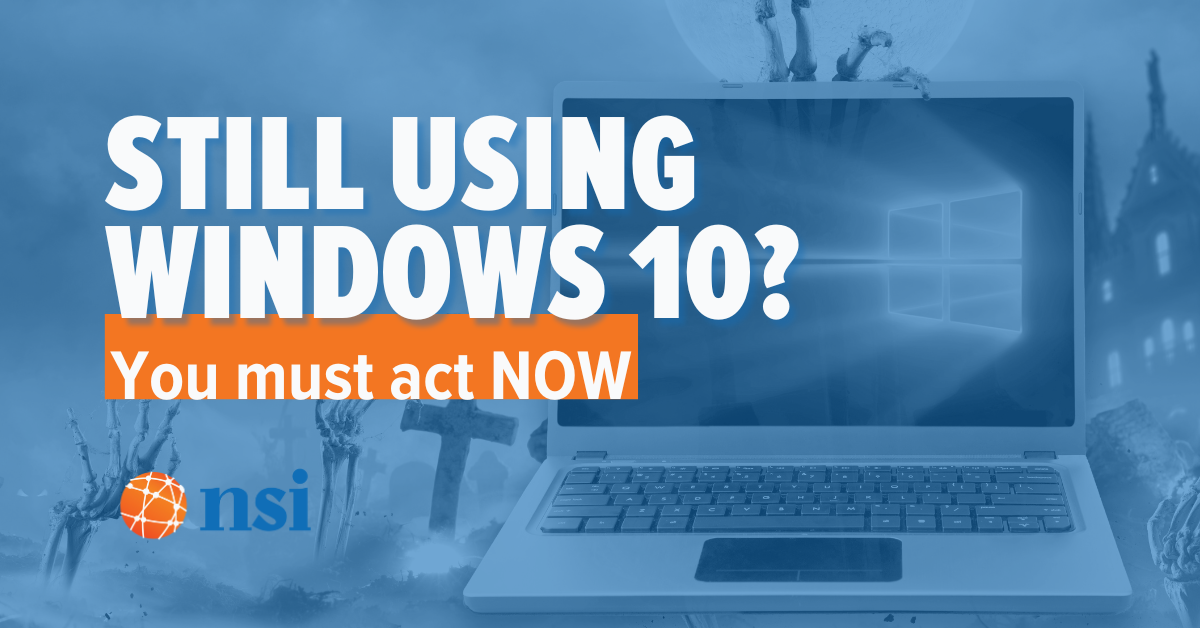Key Takeaways
- Windows 10 support officially ends on October 14, 2025 — after that, no more updates, patches, or Microsoft help.
- Continuing to run Windows 10 will leave your business vulnerable to cyberattacks, downtime, and compliance risks.
- Extended Security Updates (ESUs) are available but expensive and only for a limited time.
- Windows 11 offers significant advantages: stronger security, smoother performance, and tools built for hybrid teams.
- Not all devices qualify for Windows 11; therefore, planning for potential hardware upgrades is crucial.
- The sooner you prepare, the smoother and cheaper the transition will be.
NSI can guide you through every step—from assessment and planning to migration and ongoing support.
Picture this: one of your business’s most relied-upon tools suddenly becomes unsafe. That’s precisely what’s about to happen for companies still running Windows 10.
Microsoft has confirmed that support for Windows 10 officially ends on October 14, 2025.
That’s not far away—and the closer we get, the more expensive and challenging upgrades will become.
If you’re not actively preparing now, your business could be at risk.
Why End of Support Is a Serious Issue
When Windows 10 reaches end of life, it’s not just about missing a few updates—it’s about losing Microsoft’s safety net altogether.
Here’s what that means for your business:
- No security patches → Cybercriminals can exploit unprotected vulnerabilities.
- No bug fixes → Small issues can snowball into operational disruptions.
- No Microsoft support → If something breaks, you’re on your own.
Yes, your computers will technically still run. But using them is like leaving your front door unlocked and hoping no one notices.
Many Companies Aren’t Prepared
Surveys reveal that nearly a third of business leaders don’t realize Windows 10 support is ending—or they’re aware but haven’t taken action.
That lack of preparation opens the door to:
- Costly downtime
- Data breaches and compliance violations
- Emergency upgrades that blow up budgets
Extended Support? Not the Long-Term Fix
Microsoft will offer Extended Security Updates (ESUs), but:
- They’re expensive (and their cost increases each year).
- They only cover security, not features or bug fixes.
- They’re a short-term band-aid—not a proper solution.
Businesses that delay will end up spending more while still needing to transition later.
Why Moving to Windows 11 Is the Smart Play
Windows 11 isn’t just “Windows 10 with updates.” It’s a platform designed for today’s business needs:
- Next-level security built to counter modern cyber threats
- Performance improvements that streamline workflows
- Hybrid team features for flexible work environments
- Deep integration with Microsoft Teams, OneDrive, and Copilot
The result? A more secure, more productive, and future-ready business environment.
Don’t Forget the Hardware Factor
Here’s the catch: not every device running Windows 10 is eligible for Windows 11. Older machines may need to be replaced.
This is where planning is critical. If you wait until the last minute, you risk supply chain delays, budget overruns, and rushed rollouts.
How NSI Helps Businesses Navigate This Change
At NSI, we understand that operating system upgrades are more than just installing software—they’re about ensuring your business continues to run smoothly while remaining secure.
Here’s how we support our clients:
- Assessment → We review your current hardware and software environment to identify risks and opportunities.
- Planning → We build a tailored migration roadmap that minimizes disruption.
- Execution → Our experts handle upgrades, deployments, and integrations seamlessly.
- Support → We provide ongoing guidance so your business doesn’t just “survive” the upgrade, but thrives with Windows 11’s new capabilities.
The Clock Is Ticking
October 2025 is coming fast. The longer you wait, the higher the costs and risks.
- Don’t leave your business exposed.
- Don’t get caught in last-minute chaos.
- Let NSI help you transition with confidence.
Schedule a free Windows 11 Readiness Assessment with NSI today
Conclusion
Windows 10 end of life isn’t just an IT milestone—it’s a business-critical event. Companies that take action now will be secure, compliant, and positioned for growth. Those who don’t will face avoidable risks and costs.
Ready to prepare your business? Contact NSI today and let’s work together to build your Windows 11 migration plan.
Frequently Asked Questions
Can I still use Windows 10 after October 2025?
Yes, but it won’t be supported by Microsoft. That means no security updates, which leaves your business vulnerable.
What if I can’t afford to upgrade right now?
Microsoft offers Extended Security Updates (ESUs), but they’re costly and only temporary. Planning an upgrade now avoids bigger expenses later.
Do all my PCs need to be replaced?
Not necessarily. Some machines can upgrade to Windows 11, but older hardware may not qualify. NSI can run a compatibility assessment for you.
How long does the migration process take?
It depends on the size and complexity of your business, but starting early allows for a smooth, disruption-free transition.
Why partner with NSI instead of doing it ourselves?
Because an operating system upgrade isn’t just technical—it’s strategic. NSI ensures security, compliance, and productivity are all aligned, while reducing downtime and cost surprises.
